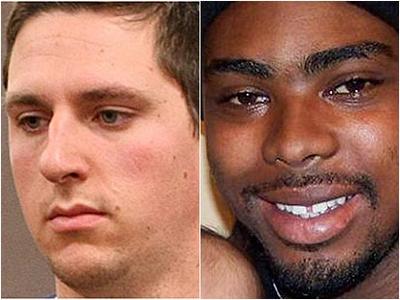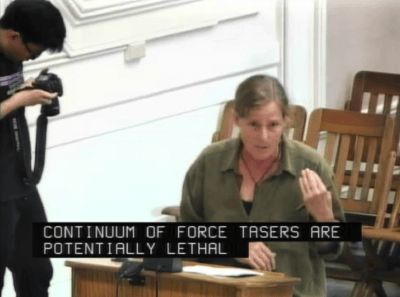by Ann Garrison
KPFA Weekend News broadcast Oct. 10, 2015
Both the Richmond and BART Police Departments sent taser advocates to the Oct. 6 Berkeley City Council hearing, but neither is an exemplar of responsible taser use. BART Officer Johannes Mehserle claimed to have mistaken his gun for his taser after he shot and killed Black teenager Oscar Grant, and Richmond officer Kristopher Tong tasered Black teenager Andre Little in the testicles.
Transcript
KPFA Weekend News Anchor Sharon Sobotta: The Berkeley City Council held a special hearing earlier this week regarding the Berkeley Police Department’s request to be armed with tasers. Advocates for the homeless, the disabled and the mentally ill joined Berkeley Copwatch and San Francisco’s Idriss Stelley Foundation to speak against arming the Berkeley Police with tasers.

Officers from the Richmond and BART police departments also came to advocate for taser use. A team from Stanford’s Criminal Justice Center then presented their research and said there’ve been very few statistically controlled and credible studies to support conclusions about tasers’ efficiency or danger.
KPFA’s Ann Garrison spoke to Berkeley Copwatch co-founder Andrea Pritchett about the hearing.
KPFA/Ann Garrison: Andrea, could you describe the report that the Stanford researchers presented to the Berkeley City Council?
Andrea Pritchett: Yeah, this research team from Stanford did a really exhaustive literature survey. And they looked at all the studies and reports that are out there. They weeded out, actually, a fair amount of bias … studies that were actually financed by Taser International.
So they really did a very thorough job and their conclusions were very inconclusive. And at the end of it, they said more research is needed because they weren’t able to verify that tasers actually reduce injuries to officers or actually reduce injuries to suspects. It depends on whether you think 50,000 volts of electricity in someone’s body could be considered an injury. So really the study was very inconclusive.
So I don’t know if one particular officer has a positive experience with tasers, that’s not really everybody’s experience. That’s not what’s really going on out there.
I thought it was really noteworthy that a representative of the BART Police came in to lend his and his department’s support for the use of tasers, when we know that the officer – Mehserle – who killed Oscar Grant, he was trained so well that he couldn’t tell his service gun from his taser. So it was kind of a tragicomedy there to have BART supporting taser use by Berkeley police.
KPFA: Yeah, it also seemed ironic that there was a Richmond police officer there, and the Richmond police made international headlines about a case in which an officer tasered a Black teenager in the testicles.

Andrea Pritchett: Yeah.
KPFA: So what’s the procedure going forward for the City of Berkeley to make this decision?
Andrea Pritchett: Well, as far as I can tell, there is no proposal before the council. They had asked for a report to be done and the report was done. They received the results of that report and now it’s up to whether or not a council member is going to actually propose that tasers be acquired by the Berkeley Police Department.
I think this is a really bad time for them to do that, because right now there’ve been some serious allegations of racial profiling. Recently a few organizations – NAACP, Copwatch, various groups – got together and looked at the data and found that African Americans are six times as likely to get stopped in Berkeley. They only represent less than 8 percent of the population, but they’re 30 some percent of the stops.
KPFA: Are you talking about traffic stops there?
Pritchett: And this is only traffic stops. The BPD did not release the pedestrian data, the non-traffic stops, which we suspect are even higher in their disparity. So Berkeley’s got a racism problem here. And it would just be really incredible to think that any council member could consider moving a taser proposal forward when they have such a glaring problem with disparities.
You know they’re claiming that they don’t have money for body cameras, so I can’t imagine that they’d be able to find money for tasers. And if they do, what an incredible insult that would be to the people of Berkeley.
KPFA: That was Berkeley Copwatch co-founder Andrea Pritchett. In Berkeley, for Pacifica, KPFA Radio, I’m Ann Garrison.
Oakland writer Ann Garrison writes for the San Francisco Bay View, Black Agenda Report, Black Star News, Counterpunch and her own website, Ann Garrison, and produces for AfrobeatRadio on WBAI-NYC, KPFA Evening News, KPFA Flashpoints and for her own YouTube Channel, AnnieGetYourGang. She can be reached at anniegarrison@gmail.com. In March 2014 she was awarded the Victoire Ingabire Umuhoza Democracy and Peace Prize for promoting peace in the Great Lakes Region of Africa through her reporting.





